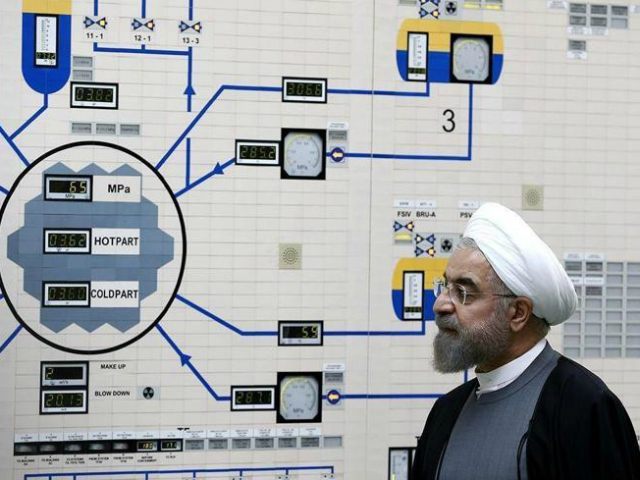President Obama said once again on Tuesday that the U.S. would “walk away” from a bad deal with Iran. Apparently, the definition of a “bad deal” does not include one that tosses out a key commitment included in the U.S. fact sheet published in April.
“Iran will implement an agreed set of measures to address the IAEA’s concerns regarding the Possible Military Dimensions (PMD) of its program,” the U.S. fact sheet published in April states. In addition, the document states sanctions relief will be contingent on “the completion, by Iran, of nuclear-related actions addressing all key concerns (enrichment, Fordow, Arak, PMD, and transparency).”
But even as the deadline for the deal was extended Tuesday, President Hassan Rouhani once again denied Iran had ever performed any military research related to nuclear weapons. “If they claim that they want to prevent the development of nuclear weapons in Iran, they should know that Iran has never sought to build nuclear weapons,” Rouhani said, according to a report by Press TV.
This comes just two weeks after Secretary of State John Kerry seemed to cave publicly on the issue. On June 17th, the World Tribune reported Kerry saying, “We’re not fixated on Iran specifically accounting for what they did at one point in time or another. We know what they did. We have no doubt. We have absolute knowledge with respect to the certain military activities they were engaged in.”
This is quite an odd statement given that Iran’s trustworthiness when it comes to nuclear research is arguably the key issue in the negotiations. In essence, Kerry has given Iran space to sign a new promise not to engage in nuclear weapons research without admitting it has already engaged in such research in the not too distant past. According to the IAEA, that research included plans to mount a nuclear bomb on Iran’s Shahab 3 missiles which are capable of carrying a warhead up to 800 miles.
Almost from the moment the framework was announced in April, Iran had refused to change its tune on PMD. On April 9th, a week after the announcement, President Rouhani and the Director of the Atomic Energy Organization of Iran appeared at a an event celebrating Iran’s nuclear technology achievements. Rouhani claimed Iran had never sought nuclear weapons and never would. Iran’s Atomic Energy Director rejected “unfounded allegations” about Iran’s past research.
These ongoing claims are consistent with the denials Iran has made since 2008 when the IAEA first confronted the regime with evidence showing it had engaged in nuclear weapons research. At the time, Iran claimed all of the evidence, which was collected by foreign intelligence services including the U.S., was “fabricated.”
Of course, it is always possible Iran will change its tune at the last moment, but for now it seems the U.S. has backed down to the point that they are unlikely to feel any need to do so. For the sake of a deal, President Obama has apparently agreed to pretend Iran’s previous covert research program, and its unwillingness to come clean despite thousands of pages of evidence, has no connection to whether it can be trusted to keep its future commitments.

COMMENTS
Please let us know if you're having issues with commenting.